
Janice Wyatt (second left) at the reception, flanked by her children (from left) Jessie, Colin, and Matt.
The Dorchester Education Foundation launched its first major public event on Saturday, November 8, with a waterfront fundraiser that combined community spirit, gratitude, and a strong commitment to local education.
Held at the Lee Creek home of Foundation board member Steve Heyneman, the gathering drew educators, civic leaders, business supporters, and alumni of Dorchester County Public Schools.
The highlight of the event was the public launch of the John Wyatt Scholars Program, a new scholarship honoring the late Dorchester-based philanthropist John Wyatt. Introduced by Wyatt’s son, Matt, the initiative will provide $10,000 annually to students who excel in community service, and it provides a solid base for the new organization.
Matt Wyatt described the scholarship as a way to continue his father’s legacy of supporting young people, especially those who devote their time to education.
“My father passed away in May after a long battle with cancer,” Wyatt said. “Since then, our family has worked to continue his mission through the J2W Foundation. His relationships with the youth of Dorchester and the resulting impact on this community were among the most treasured achievements of his life.”
He said his father’s work in the county focused on early childhood education, mentoring, and out-of-school learning opportunities. “He was someone who could take big ideas and turn them into practical goals,” he said. “Even when results weren’t immediate, he never stopped believing in the potential of this county’s young people.”
Wyatt noted that recent student assessment results reflect that long-term investment. Third-grade reading scores have risen 17 percent and math scores 10 percent over the past year, the highest gains of any Maryland county. “He would have been overjoyed to see this progress,” he said. “The scholarship will help students take their next step while reinforcing the importance of service to others.”
Chris Wheedleton, who serves on both the county Board of Education and the Foundation’s board of directors, said the Wyatt Scholars Program will reward students who exceed Maryland’s 75-hour service learning requirement.
“These scholarships will not be limited to high achievers academically,” Wheedleton said. “They will go to young people who double their service hours and show leadership by giving back through tutoring, mentoring, or helping younger students succeed.”
He called the Wyatt gift one of the largest single scholarships now available in Dorchester County and a model for how local philanthropy can strengthen ties between the county’s academic and business communities.

Dorchester County Superintendent of Schools Jymil Thompson (center) at the fundraiser with Cambridge City Commissioners Shay Lewis-Sisco (left) and Frank Stout (right).
Dorchester Superintendent of Schools Jymil Thompson offered personal reflections on John Wyatt’s influence on him and his career. As principal of Mace’s Lane Middle School, Thompson worked with Wyatt to fund an alternative classroom program for students who were struggling.
“John invested in me like no other person has in my lifetime,” Thompson said. “He believed in professional growth and development.” He recalled that Wyatt brought the Campaign for Grade-Level Reading to Dorchester and helped create the pre-K3 program, which now serves nearly 100 students.
Thompson said Wyatt’s example of steady, values-driven giving inspired others to carry on his work. “John taught me about the power of investment. He focused on giving people the tools to make a difference and aligned his actions with his words, which is something I try to carry into my own work every day,” he said.
The fundraiser also included recognition of three distinguished alumni from Dorchester County Public Schools: business leader and education advocate Kevin Beverly, Chamber of Commerce President Bill Christopher, and longtime teacher Denise Aldridge.
Christopher was unable to attend in person but sent remarks thanking his wife, Candace, and the Chamber board and staff for their collective commitment to the community. He credited his teachers and coaches for instilling a sense of service that continues to shape his work.
“All I have done during my career was taught to me by my family and a dedicated group of teachers and coaches, to do my best and help others succeed whenever I have the opportunity,” he said.

Dorchester-born business leader Kevin Beverly (left), an avid cyclist, received a photo of the county’s one hill in honor of his being a distinguished alumnus of the county schools from Chris Wheedleton, a Board of Education member who also sits on the Foundation board.
Dorchester Education Foundation president Donna Newcomer said the event served as both a fundraiser and a call to action. The Foundation plans to open applications on December 1 for $1,000 innovation grants for educators across the county.
“These funds will help teachers bring creative ideas to life in their classrooms,” Newcomer said. “The Wyatt scholarship represents the kind of forward-looking philanthropy we hope to inspire.”
Wheedleton closed the day by thanking local businesses and organizations for their contributions of food, desserts, and silent auction items. He urged those present to stay engaged as donors, mentors, and advocates for education.
“What we’re doing here is about more than writing checks,” he said. “It’s about creating a culture where every business, civic group, and resident sees a role in helping our students and schools thrive.”
The event signaled a renewed effort in Dorchester County to invest in its schools, its teachers, and the next generation of community leaders. For more information or to donate, click here.












